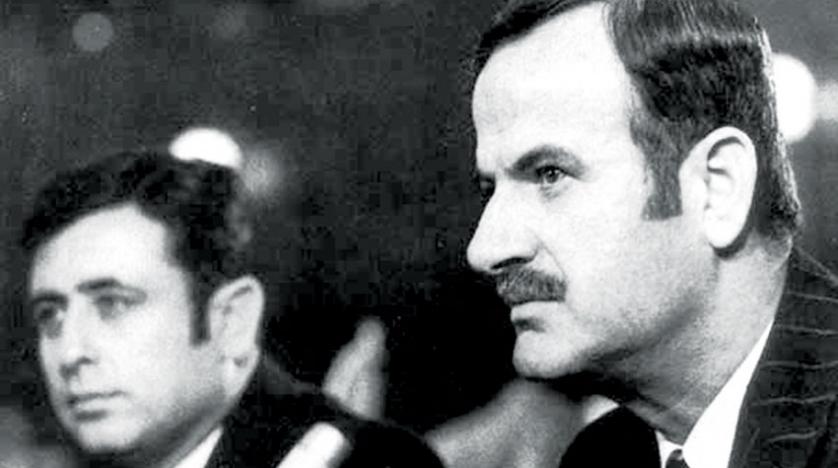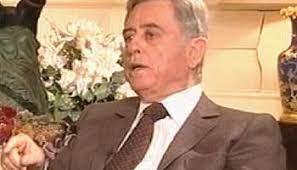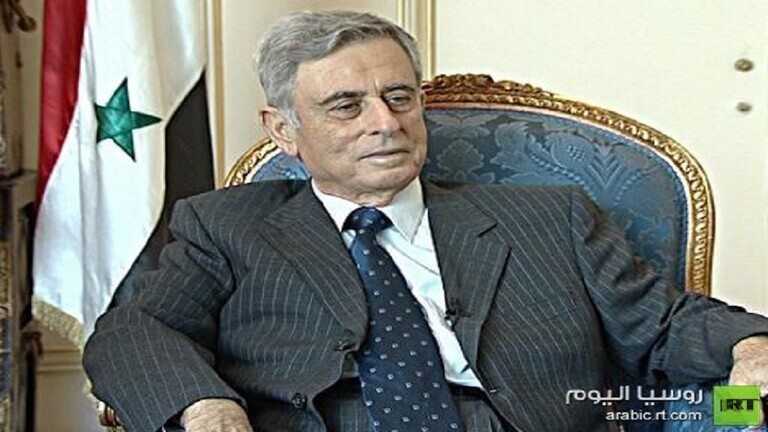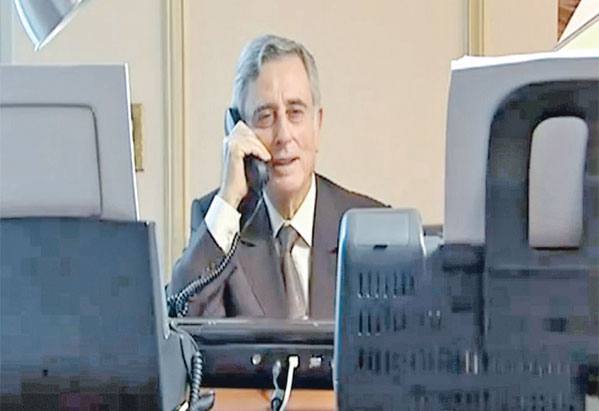“He said that it was difficult to break away from the Syrian regime because it’s an all-encompassing system that kills the friend before the enemy.
Inside his house near the Arc de Triomphe in the heart of the French capital, Paris, ‘Al-Massa’ met with Abdel Halim Khaddam, one of the most knowledgeable about the intricacies of the Syrian file. He served as deputy and foreign minister to both Presidents Hafez and Bashar al-Assad, tasked with two of the most dangerous and mysterious Middle Eastern issues: the Lebanese and Iraqi files.
Abdel Halim Khaddam confessed, from the seat of ‘Al-Massa’, about the secrets of his relationship with the father and son regime ‘drowned in corruption and tyranny’. He spoke about Hafez al-Assad’s obsession with inheriting power within his family, and how Bashar al-Assad sought to be part of it, initially criticizing his father’s regime, and calling him ‘Uncle Abdel Halim’. He also recalled the moment he found himself as the President of the Republic after Hafez al-Assad’s death, the behind-the-scenes of amending the constitution to make Bashar the country’s president, and how he decided to leave Syria and transform into the regime’s biggest enemy. He claimed that the regime planned to establish a state on the coast, where the Alawite majority, to which the Assad family belongs, resides. Abdel Halim Khaddam also talked about his relationship with Hassan II and Mehdi Ben Barka, and how the Syrian stance on the Sahara issue changed. He said that the Algerian President Abdelaziz Bouteflika did not rid himself of the ideas of his predecessor Houari Boumediene.”
- How was Hafez al-Assad’s relationship with religion?
Those who interacted with him believed he was a graduate of Al-Azhar University. His relationship with religious figures was extensive; he supported and aided them. However, his actions didn’t align with this. His support for religious figures was often a cover for other hidden activities. In reality, all the religious figures were hypocrites who stood on pulpits and prayed for his health and long life.
- How was his religious practice?
He would go to the mosque for prayers on occasions and Muslim holidays, but other than that, nothing. He prayed only on occasions.
- American journalist Thomas Friedman, in his book “From Beirut to Jerusalem,” claims that Rifat al-Assad, Hafez al-Assad’s brother, told officers under his command during the Hama massacre in 1982, “I don’t want to see a house in Hama that is not burning.” How accurate is this account?
Rifat al-Assad led the Defense Brigades that played a significant role in the events in Hama. But did Rifat say this or not? I don’t have information about that.
- But did it happen?
In reality, it did. An issue erupted in Hama due to the Muslim Brotherhood carrying out terrorist operations and assassinations against regime figures, prompting intervention. Yes, crimes were committed, but the solution wasn’t to destroy the city. The state should be just and merciful; the solution was to handle the situation quietly within certain boundaries, because the state’s responsibility is to protect people, not kill them. The state shouldn’t have bombed the city in that manner and destroyed it over the heads of its inhabitants. Even if it required a twenty-year siege.
- What is your responsibility, as you were the Vice President, regarding the Hama massacre?
Believe me, the entire party leadership didn’t know about what happened in Hama until more than a month later.
- How is that possible?
Because the city was surrounded and communication was cut off, and the party leadership only knew about it after Hafez al-Assad made the decision to rebuild Hama. He needed funds, and thus, an additional budget, which required a decision from the party leadership. It was only then that we knew Hama was destroyed, and then the news started coming in. Of course, everyone was in pain.
- If I ask you to provide a self-critique of the period when you shared responsibility with both Hafez and Bashar al-Assad, what can you say?
Firstly, I was responsible for foreign policy and I bear all responsibility for what happened at that level. Secondly, I am ready to take responsibility if a Syrian accuses me of mistreating them or mistreating anyone. But within a comprehensive regime, a regime that kills the friend before the enemy, it wasn’t reasonable for me to step out of line at that stage when the executioner’s knife was hanging over my head.
- Don’t you consider that you were complicit, even in silence, with the Hafez and Bashar al-Assad regime?
Absolutely not, because an individual doesn’t make a difference, silence belongs to governments and people. Let me give you three examples: Salah Bitar, one of the party’s founders, wrote an article criticizing the regime and was assassinated in France. Muhammad Imran, a prominent Ba’athist military leader, had a role in the March 8, 1963 movement (the Ba’ath Party coup against elected President Nazim al-Qudsi). He disagreed with the regime and started to become politically active in Tripoli, Lebanon, and was then assassinated. Salah Jadid disagreed with Hafez al-Assad and was imprisoned for 25 years and only left prison dead. During these periods, the Syrian people weren’t ready for revolution; fear was planted in every Syrian’s mind, and people were afraid of their own shadows. Do you think that, under all these circumstances, I should have approached Hafez al-Assad and said to him: “You’re a criminal”? Whoever dares to do that is like someone going to commit suicide.
- Who did Hafez al-Assad hate more, the Islamists or the communists?
The communists were his allies.
- But he imprisoned a significant number of them?
He didn’t imprison members of the Communist Party, as they were partners in governance. He did, however, imprison members of the Communist Labor Organization, a new Marxist current at the time. On the other hand, his dislike for extremist Islamists was significant.
- Is there still a role that the Syrian Ba’ath Party can play in a post-Assad regime democratic Syria?
I believe that if the Ba’ath Party doesn’t cleanse itself and hold accountable all those who were involved in crimes and corruption with the regime, it won’t have a future. But a clean Ba’ath Party, untainted by crime or corruption, could be among the remaining parties. However, it will need a long, very long time to regain its essential role in political life.
- Do you still consider yourself a Ba’athist?
- I left the party.
- I mean ideologically.
- Which ideology? We shouldn’t forget that the party went through various stages. The ideology outlined in the documents is not something I align with anymore, as it embraced Marxist principles. Despite the corruption that emerged, many principles unrelated to reality were not amended.
- What principle or idea from the array of Ba’athist ideas and principles do you still believe in?
- Nothing from that ideology binds me anymore.
- Not a single idea?
- Except for the idea of freedom, because the Ba’ath Party was founded on three principles: Arab unity, freedom, socialism.




